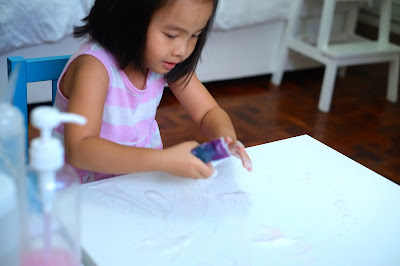It really is one of the strangest sights in the Montessori classroom to see a student wash a table. Why are they wasting precious studying time doing chores? Why is the school forcing my child to do menial work? Who washes a table anyway?
I must admit even I pooh-poohed this activity all the way until Ladybug graduated preschool. I get the logic fine: practical life is the first important curriculum because it lets children become independent and empowered when they see they can do things by themselves.
But washing tables? I was skeptical. We have helpers as part of our homes - would children ever really contribute consistently in that way? Would it ever really matter in the grand scheme of priorities? Eventually everyone learns practical life at some stage in their life anyway (um, in my case when I got married).
Washing tables seemed like a filler; unlike the more useful things like learning to button and ribbon.
 |
| A typical preparation to wash tables: jug of water, bar soap, sponge, bowl and towel -- all ready for students to choose freely in the classroom everyday |
True, when I watched the practical life side of the classroom at parent observation day I saw that students did it with either peaceful energy or intense concentration. In that moment they were in the groove. Watch this adorable video from itsapracticallife: https://instagram.com/p/5XDC5VCB9p/.
I faithfully copied this at home for the heck of it, just to model consistent values. I have a squeeze bottle of water, sponges and tissue as part of her regular art shelves.
 |
| "Cleaning" her table and floor two years ago, at four years old |
When we did this liquid watercolour work last year, I pointed out that her work table got paint on it.
 |
| She squeezed water and wiped it off |
 |
| For the remaining stains, she got her hand wash in the bathroom and used the sponges |
 |
| You can see how intent she is in this work |
So okay, it was a nice thing to do at home but more for pretending that she's independent.
No harm, but no real value either.
A year later.
She now has a taller and sturdier table in her room. She loves it. She's a big girl now.
After a playdate activity with crayons left marks on the table, I shrugged it off as part of the deal.
But not her. She loves her table. Her face lights up. I know what to do, she yells and disappears.
I come back to this and took this picture from her doorway:
 |
| When she was done she mopped the floor. (I also have these cleaning supplies in her room) |
I was completely impressed. She showed she could care for her own things if she was empowered enough to really take charge of her own things. Look at that first photo! She was confident. She was proud of herself for solving the problem.
I thought about all things we would do for her because we thought she couldn't do it, or because it was faster to do it for her : packing away, charging her iPad, picking up her shoes, feeding her.
I had undermined this washing of tables for three years!
It meant so much more to her than it did to my grown-up eyes.
It's not too late, I am happily looking for other 'tables' for her to wash with confidence and pride.


I want that training! That's why whenever my daughter wants to help, I won't hesitate. with supervision, I let her do it. I think in that way I am teaching her in independence. It looks like she wants to do some household chores, so I let her be. Again with adult supervision...
ReplyDeleteAnd it's such a nice bonding thing to do together too! Montessori at home works wonders even for other types of schooling. I really wish I had cooking talent so we could do that together too! Haha
DeleteWhat a beautifully and accurately written post! You are right -- somehow it's so much easier to say I'll do it for you. But the time and effort that is spent cultivating this care of environment in them is so valuable beyond measure. You have raised another important reminder for me -- that it's worth to spend some money getting more expensive and beautiful things for the children to care for. It's the same concept as letting children use breakables -- I think just our sheer non-verbal expression gives them enough of a cue of how they ought to treat their belongings. It's easy to say lets get the cheap stuff so they can really trash it and I won't feel sad. But it's not really a habit we want to train our kids! Thanks for this!
ReplyDeleteThank you so much, Elaine! You have no idea how I much I learn from you, and wish I could do all the wonderful practical life activities you do with your son!
DeleteI agree! Your chronicling of this activity for a number of years is what is so impressive about this post. It is amazing what goes on when a child scrubs a table. It is always one of the most popular activities in a Montessori classroom and it is wonderful that you offered the tools for your child to continue this important skill building activity at home (for years!) Great insight.
ReplyDeleteThank you for your sweet words, Carolyn! You just made my day, we moms need all the encouragement we can get too!
Delete